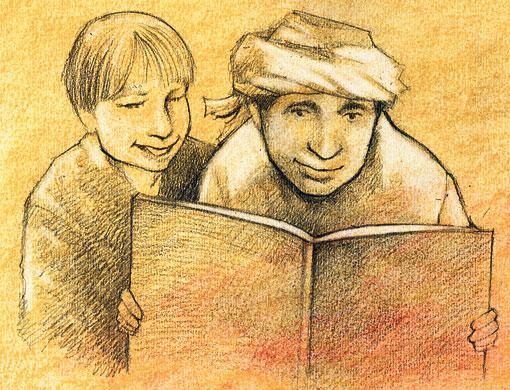One of the main challenges faced when travelling to a foreign land is the sense of disorientation you feel when you first arrive. Even if you know the language it takes a while to adjust to the various signs and instructions but this challenge increases many fold if you have little or basic knowledge of the language.
This feeling is only a taste of the experience felt by one fifth of the world's population as they awake every day to the foreign land that is the world around them.
Literacy is a term that defines the ability of a person to read and write to a certain level. If we do not have this essential skill, life can be very difficult. We need to be able to read and write to use a computer, to find directions to a place, to find out information, to read instructions, and as an entry to most other areas of academia.
This is at a most basic level of need and something that governments around the globe are trying to provide for their people.
According to Unesco's, 'Global Monitoring Report on Education for All 2008' 776 million people around the world, two thirds of them women, lack basic literacy skills.
The problem is particularly acute in the Arab world where the adult literacy rate is 66 per cent, one of the lowest in the world.
The overall figure, however, masks the huge discrepancy that exists with the Arab population with variations of around 50 per cent of the population who are literate in Mauritania, Morocco and Yemen to more than 90 per cent in Syria, Lebanon, Jordan and Palestine.
Today, for instance, is International Literacy Day, a day initiated by Unesco in 1966 and designed to highlight the importance of literacy to individuals, communities and societies.
Magrudy's bookshops will be launching a programme called 'Tell us about your favourite book' with each submission guaranteeing a donation of Dh25 to a programme supporting the promotion of literacy.
One of the key platforms of Dubai Cares which was launched by His Highness Shaikh Mohammad Bin Rashid Al Maktoum, Vice-President and Prime Minister of the UAE and Ruler of Dubai, is the eradication of illiteracy in the Arab world.
A number of initiatives are underway including a primary school education programme which will benefit more than 150,000 children in Niger.
There is, though, another issue that inhibits reading within the Arab world and that is the absence of a culture of reading encouraged from a child's early years. While there is a very strong tradition of oral storytelling, particularly across the Gulf states and the Levant there is not the same tradition of reading to children that is a commonplace habit in the West.
An absence of suitable texts in Arabic is a major contributory factor and this is partly being alleviated by programmes to translate major works into Arabic such as the Tarjem programme that the Mohammad Bin Rashid Foundation in Dubai is undertaking and the Kalima programme initiated by the authorities in Abu Dhabi.
There has also been an encouraging growth recently in the number of authors in the Arab world who are now writing for children of all ages.
Too often, though, reading is associated with duty and school it's a slog, felt to be an unnecessary burden by many children across the region.
One of the goals of the Emirates Airline International Festival of Literature, of which I am Festival Director, is to encourage people of all ages to feel the joy of reading.
Prior to this year's Festival Nahad Al Shawa, a well-known Saudi-based children's author, visited Deira International School and it was a privilege to see how she was able to engage a group of around 20 six-year-old children as she read from a selection of her stories.
She inspired the children to write down their dreams and send them to her, and in a very short time she had the whole group of young children looking at books and reading through different eyes and with such enjoyment.
This was a prelude to Education Day which took place at the Festival itself where more than 30 leading international authors went to schools and colleges throughout Dubai to read excerpts from their works and discuss their lives and literature with the students.
For the 2010 Emirates Airline International Festival of Literature, we are again making literacy a key focus, with the addition of a strand looking at the issues surrounding translation from and to Arabic.
In view of what we learnt from our inaugural festival, we have increased the number of children's authors, as we know this will have a very positive effect on young audiences in encouraging them to pick up a book for pleasure.
Reading books for pleasure is a joy that not everyone is lucky enough to discover. The more we can do, as parents, educators, writers, publishers, to open that magic door for children will certainly be of long term benefit to those young people.
Isobel Abulhoul is Director of Emirates Airline International Festival of Literature (EAIFL) and founder of Magrudy's.









